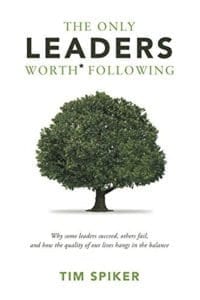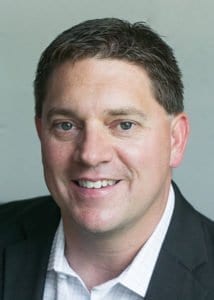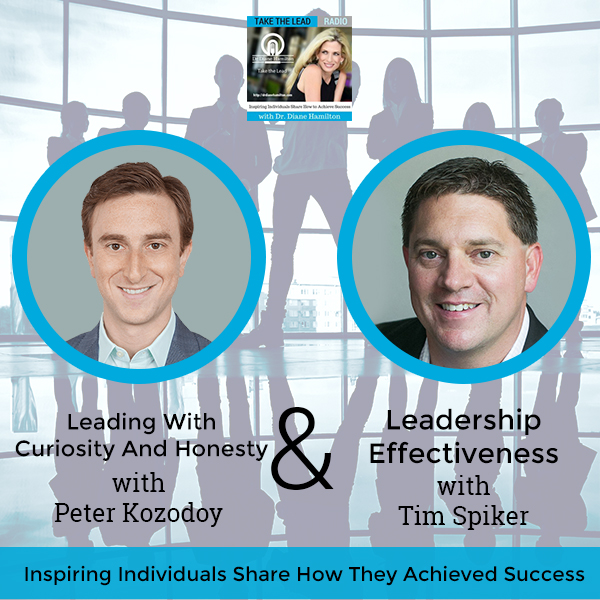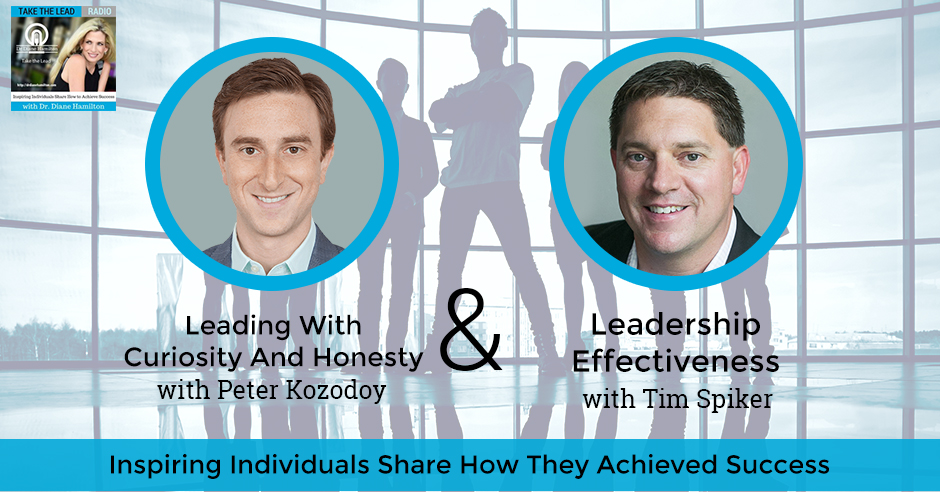Life can be full of obstacles and challenges, but we can gain great fulfillment by overcoming all of these with curiosity and honesty. These values are also vital as a leader to lead with utmost honesty to create an organization that also reflects theses values. Peter Kozodoy joins Dr. Diane Hamilton to talk about these values. He relates them to our open-mindedness to accept failure, which, in turn, can help us become individuals who are ready for change and influences others in the organization to do the same. Peter is a TEDx speaker and entrepreneur who empowers businesses to adopt these values.
Be it in business or anywhere else, every team needs a leader, an individual representing the values of the organization and effectively guides them to the path that is for their greatest benefit. They are those who encompass excellent social relationships with their team and have effective decision-making skills. Tim Spiker joins Dr. Diane Hamilton to talk about development journeys and learning experiences related to leadership effectiveness. Tim is the Founder of The Aperio and the author of the book The Only Leaders Worth Following.
I’m glad you joined us because we have Peter Kozodoy and Tim Spiker. Peter is a TEDx speaker. He’s the author of Honest to Greatness. Tim is the author of The Only Leaders Worth* Following. We’re going to learn a lot about leadership and it’s going to be fascinating.
Watch the episode here:
Listen to the podcast here
Leading With Curiosity And Honesty With Peter Kozodoy
I am here with Peter Kozodoy who is a TEDx speaker and author of Honest to Greatness: How Today’s Greatest Leaders Use Brutal Honesty to Achieve Massive Success. He’s also a serial entrepreneur and serving as the CEO of Stradeso and the Partner Chief Strategy Officer of GEM Advertising. Peter’s largest business has appeared on Inc. 5000, Forbes, and Huffington Post. It’s nice to have you here.
It’s a pleasure to be here.
I liked your TEDx Talk. I have a lot of questions about that one because it ties into a lot of the stories I tell in my book about Netflix and Blockbuster and some of the things you talked about. I want to get a little bit of a background on you before we get into some of these things because a lot of people would like to know more so they can know who they’re reading about.
My journey starts as a male figure skater. I was a highly competitive figure skater. I always knew that I was going to go to the Olympics and life had other plans for me. Right around the time of eighteen was my first smack in the face with brutal honesty and having to get honest with myself about where life was going to take me against my will and wishes. I parlayed that into an entrepreneurial career. At 22, I got out of college. It was 2008, which is the luckiest time ever to come out into the real world. I started a company with my business partner. Principally, because I’m a pain in the ass.
Nobody wants me to work for them. I questioned everything. I was wondering why. I want to think I can do it better as entrepreneurs. We started as a video production company making $800 television commercials for local car dealers, which is exactly as glamorous as it sounds. I remember thinking to myself, “If only we could make more $800 television commercials, we’d be rich.” I’d studied economics in college, but apparently not math because it would have taken a lot of those and a lot of running around like a chicken with my head cut off to make that happen.
We started pivoting after a couple of years of poverty. We were getting hired for video production by other agencies. That’s when we realized, “These agencies are terrible. They don’t know what they’re doing. Their strategies suck. They overcharged and missed deadlines. We can do this better.” In true entrepreneurial fashion, we changed our name to GEM Advertising. We were like, “We’re a full-service agency now.” We went out and pitched that business. We finally got our first $1 million client and then kept rising from there. It’s been a wild ride.
I know a lot of people go through a lot of wild rides to get their companies off the ground. I like that you question everything since I’m a curiosity expert. You also mentioned that people sometimes see that as a pain in the ass. That’s the message we hear sometimes. They don’t want to have questions in some of these businesses. Asking questions is what’s going to keep people from being Blockbuster and having the Netflix eat their lunch. You talked a lot about that in your TEDx Talk. You blame it on the fact that we need to be honest. Is honesty all tied in to curiosity?
That is exactly how many of the leaders and organizations that I profile in my book from Quicken Loans to the Ritz-Carlton to Sprint to Bridgewater Associates. That’s how they created massive profitability and dominated their competition. It’s by getting curious about what those leaders didn’t know, which is a massive amount compared to what they do know. I summarize all that as honesty, but it is curiosity, open-mindedness, and willing to admit fault, it’s ready for change. These are all the ways in which we need to redefine what it means to be an honest leader and an honest organization. I’ll give you an example for honesty and curiosity. I interviewed Bethenny Frankel a few years ago.

Leadership Effectiveness: Moving through life with curiosity and honesty is how you achieve success in a world where everyone has information that most of us assume we already know.
She went from nobody to real housewife on television drama to growing a nine-figure alcohol business. I’m interviewing her and she’s telling me that her key to success has been honesty. She’s honest about what she knows and what she doesn’t know. She’s obsessed with her own ignorance and filling that gap. Lo and behold, we’re at Advertising Week, New York and we finished the interview. She goes on stage and I’m watching from off the side. There’s a bunch of guys, ad executives, and Bethenny Frankel.
She stops the entire panel midway, interrupts like shuts the whole show down. She’s like, “I don’t know what that marketing term means. Can you explain that? I want you to explain that to me.” She does this and always saying, “I don’t know. Explain to me what that means.” You can imagine if you move through life with that kind of curiosity and honesty, the amount of things that you can hear, act on, and be open to, that’s how you achieve success in a world where everyone has information, but most of us assume we already know it, which is a dangerous thing.
You bring up an important part of what I found of what keeps people from being curious. There are four things. There’s fear, which is not too surprising. There are assumptions, what we’ve told ourselves. There’s technology, which is over and under-utilization of it. There’s environment, this is everybody who’s ever impacted us. I’d love to hear some of your stories. You brought up Quicken Loans and Bridgewater. Can you give me a couple of those stories of how curiosity or honesty could have helped or was a problem?
I have many favorites. I tell a lot of them in my book. One of them that I love is Quicken Loans. It’s a private company, it competes against massive public mortgage providers like Bank of America, Wells Fargo, and all these much bigger companies with many more resources. The question is how did Quicken Loans come up with the Rocket Mortgage platform, which allows you to get a mortgage through your phone, which dominated the mortgage industry? You have to ask, “How did all these other companies miss it?” If you look into the core values of Quicken Loans, which it calls its ISMs, they have strict core values around things like, “It’s not about who is right. It’s about what is right. Ideas are worship, but execution is king.”
When you look at a culture like that, it becomes simple. They bring in interns all the time. They’re always trying to take ideas and turn them into actions. One day someone came along and said, “We’ve all got these phones. Why don’t we get a mortgage through a phone? The phone knows who we are. We can upload all the information we need. Why do we need to kill a tree every time we want to get a mortgage?” Was Quickens’ teams the only people to think of this? Probably not, but Quickens was the only company that said, “I don’t know if that’s a good idea or a bad idea, but why don’t you do it, come back when it’s done and we’ll see if it works. Let’s get curious about it and discuss if it works.” It worked because it’s a no-brainer. You can imagine a company who is constantly deploying these tests, iterating, and allowing the feedback to come back to them, acting on it. It is not much more difficult than that. For some reason, we’ve established in many organizations a culture of gatekeeping instead of innovation allowing. That I think is a massive detriment to many of these organizations.
Let’s get into Bridgewater, another one that you like.
Bridgewater is another great one. It started by Ray Dalio. Anyone who’s ever seen him speak or read his greatest book, Principles, clearly a brilliant human being. He’s a brilliant human being that in his young 30s almost lost his entire company because he made a market prediction and was convinced he was right. The market turned against him, and then his client said, “You clearly don’t know what you’re doing. We’re out.”
[bctt tweet=”We need to redefine what it means to be an honest leader and an honest organization.” via=”no”]He literally had to borrow money from his father to keep himself afloat. He is someone who’s now worth over $17 billion to put this in perspective. What did he do? He said, “Clearly, I was wrong. The important thing is not me being right, but it’s my company surviving. It’s getting to the truth whether that truth comes from me or not.” It’s simple and powerful, but not practiced a whole lot out there by executives in charge.
He built a culture of radical truth and radical transparency in which he not urged, not asked, but required the people around him to tell him when he was wrong, to bring evidence against him, to make sure that they get to the truth no matter who brings it. It’s similar to Quickens. It’s not about who is right. It’s about what is right. This is the ultimate removal of bias and ego and all those other blockers to honesty and business results. It’s simple, but not easy and not always practiced.
In your TED Talk, you talked about don’t rely on the boss’s personal lens and the removal of bias. My next book is on perception and I think that there’s so much that we need to work on in terms of looking at some of this bias. These are interesting things to study. Curiosity and bias are important to me when I’m researching behavioral issues. When you’re talking to companies, they’re like, “Show me the money or the research that shows that if we ask more questions, we’re going to have better engagement and innovation.” They don’t study that specifically where you can show them financial data. I’d like to know what you were able to find.
I do talk about data and using data within one particular chapter, which is how do middle managers use honesty to get things done in an organization? In that specific place, it’s very valuable to bring data and bring reports to bosses who need to justify their actions. Let’s flip to the other side, there’s a great book I was reading called Everybody Lies. This is a former data scientist at Google who was studying the data on gender bias. He had done surveys with men and women who wanted to conceive a certain gender. It turned out that overwhelmingly men wanted boys. They were about how to conceive a boy.
On the surveys, women preferred girls. They were interested in having more girls. He then went to the Google data and it turns out that he’s right. Men, when they go to Google and type in, “How to conceive a,” the next word is usually boy. However, when women go to Google and type in, “How to conceive a,” statistically speaking, they are more likely to also type in the word boy. If we ran things like surveys, got data, and only focused on those. The point is there’s some bias or preventative blocker in place that’s making women, statistically speaking, say out loud they prefer a girl, but then on Google say they want a boy. It could be anything.
Do they really want a girl or a boy? How do you know?
Maybe they’re searching for their husbands or it could be any number of things. The point is data can lead us astray. I built a $1 million company and then went back to business school because I walk the talk and I’m also obsessed with what I don’t know. In business school, one of the first classes we did was the data analytics at Columbia. I would say 1/5 of the data analytics course was about how to use data and manipulate it, what the algorithms are and so on and so forth. The 4/5 of that course was, “Here are all the ways you’re going to be led astray by data. Here are all the ways you can take numbers, graphs and manipulate them to produce outcomes driven by the human bias behind them.”

Leadership Effectiveness: We’ve developed a culture of gatekeeping instead of innovation-allowing, and that is a massive detriment to many organizations.
Let’s go back to Rocket Mortgage and Quicken Loans. Let’s imagine that in that scenario, the manager looked at, “Let’s get mortgages on our phones,” and said, “That’s interesting. Let’s do a six-month study. Let’s bring some customers in. Let’s see if they would like this. Let’s try to get statistical significance.” In that amount of time, any number of things could have happened. That person could have left or been fired. The person who brought that idea could have gotten frustrated and left. Some other competitor could have stolen the idea and taken it. Ironically, even though I do think there’s a place for data and I genuinely do. I also think there’s a place for taking our heads out of our own asses, looking around, using our own judgment and saying like, “Is that probably a good idea?”
I’ll give you another example with Domino’s Pizza. In around 2008, they realized they had a problem. Their customers were complaining about the pizza and they did get data. They went to their customers and figured out, “They don’t like it.” Domino’s Pizza is a nationwide chain. How many customers did they talk to? I would argue that if they talk to 100, that would probably be too many customers that said, “This pizza sucks.” What the then chief marketing officer did, which was smart, is he went to also get some responses and feedback from his fellow executives. “What do you all think? The pizza sucks,” so he could compare the two. At that point, they could have deployed a nationwide survey. They could have done all kinds of things to disprove that their pizza was terrible but they said to themselves, “If it’s 10 people, 100 people, it’s probably too much. We should probably do something about it.”
Instead of just making the pizza taste better, they went on national TV and they said to the world, “It turns out our pizza sucks and we’re sorry. You deserve better than this and we’re going to make it better,” and they did. They didn’t say like, “Nine out of ten people say blah-blah-blah.” If you ever watch a television commercial in the world, you look at the asterisk down below and you can see how data gets manipulated. The conditions under which things could be true or not. If you had seen that brutal honesty in Domino’s Pizza and bought Domino’s stock in about 2010, you would have had a 3,000% return over the next ten years.
I sold mortgages, pharmaceuticals, and many different things. I was thinking about data. Specifically, in pharmaceuticals. I can remember how much they would take a research study and 99.9% of the study didn’t make the drug look great. They’d find one sentence somewhere and they’d build a whole campaign around this one sentence that made this one thing that sounded good. I don’t think that a lot of people realize that even if there’s one good bit of data, that there could be a lot of other data out there that’s not great.
A lot of people don’t understand the whole survey process and how data is created. Everything can be manipulated to some extent. That’s a tough thing to explain. From being a researcher, including my PhD, I learned so much. As a doctoral chair, helping other people do their doctoral research. It’s squishy sometimes. It’s hard. A lot of leaders want this like, “Let me see a chart, let me see this thing,” but you do have a lot of this gut instinct. You gave some good examples of having your common sense to ask questions and go beyond with, “How do we reach out?” You mentioned a couple of other companies. Any other great stories?
One more thing about the data though I would ask executives who are obsessed with like, “Show me this comprehensive study first.” Are they using that as a crutch or an excuse to do nothing? Let me give you another great example of what the power of honesty can do. One of my favorite stories is Charlotte McCourt, who at the time was an eleven-year-old Girl Scout who wanted to sell Girl Scout cookies. That’s what they do, enterprising a young lady. She didn’t want to sell just boxes of cookies, she also wanted to sell extra boxes so she could send them overseas to Iraq and Afghanistan for the troops over there. When they get a sleeve of Girl Scout cookies, it’s like a little taste of home.
[bctt tweet=”Changing your mind takes a lot of effort, openness, and curiosity. Having lightbulb moments takes several different ingredients.” via=”no”]That’s part of why she wanted to sell many. Being the little capitalist that she is, she ends up in a sales opportunity with her father’s friend who happens to be a venture capitalist. Someone with means who could purchase tons of cookies. Instead of writing him a letter saying, “I’d love for you to buy some cookies and try to send them overseas. Please buy as many as you can.” She gives him a rating system of everything she thinks about each and every cookie on a scale from 0 to 10, 10 being the best, calling some flavors a gluten-free wasteland or as flavorless as dirt. Essentially, urging him not to buy certain varieties. She didn’t have to do that.
I have a feeling that the Girl Scouts of America probably didn’t look kindly upon that. In fact, they declined to comment for the story in my book for what it’s worth. He’s a venture capitalist and funds other entrepreneurs. He looked at this and said, “If my entrepreneurs were this good at sales, this honest, this transparent, this authentic, they’d probably sell a lot more.” He instantly recognized this as being awesome. He bought several boxes of cookies. What also happened is the letter started to get shared because it was remarkable. It was refreshingly honest. We have that phrase.
Mike Rowe of Dirty Jobs picks it up. He blasts it out to ten million people in a blog called Truth in Advertising. Once that happened, she starts to get picked up on radio interviews and TV interviews. She sells 30,000 boxes of Girl Scout cookies. It crashes her website. You can’t have outcomes like that if you simply go by the book, but you can if you use brutal honesty because it unlocks something within us. It is refreshing, remarkable, and shareable.
Over and over again, I find it in my book that that phenomenon is what turns the switch on in us as leaders and as organizations. When we get brutally honest and we recognize that honesty in each other, we’re urged to take action. We’re urged to change our minds. It is different. The bigger issue here, one that I personally struggle with is, why is it remarkable? Why do I have to write a book in 2020 about a subject we all learned about in preschool?”
I felt the same way writing about curiosity. It’s a common word, common process, common thought, “Why is this any different?” When I started writing it, I thought I don’t want to talk about it. I want to fix it. I want to see how can we get people to the next level? I focused on what’s keeping people from being curious. If you could figure out what stops people, you can move forward. What keeps people from being honest?
There are a couple of things. One is people are lazy and changing your mind takes a lot of effort. It takes a lot of openness and curiosity. While they are simple in the sense that anyone can change their mind on a dime, I have found especially through coaching entrepreneurs that having light bulb moments and shifting a mindset, it takes several different ingredients. One of which is a realization that you’re closed-minded in the first place, which is by definition an ego-assaulting thing. It offends your inner sense of, “Who am I?” Nobody walks around thinking, “They’re a schmuck.” We don’t walk around saying like, “I suck and all my ideas are wrong.” We all inherently think we’re correct and that those are the right things to think. Otherwise we wouldn’t think of them.
Open-mindedness and curiosity are always ego-assaulting exercises, having to admit that you’re wrong. That’s difficult hurdle number one. Difficult hurdle number two is you can’t do this alone. No one can play therapist to themselves. There’s a reason why therapists exist. That’s why I run a forum, a group for other entrepreneurs. We come together once a month on a Zoom call, it’s completely 100% confidential and we get 100% vulnerable about what’s going on in our lives and businesses. If we don’t get to what’s happening in our lives, we stay on the surface. Ninety-nine percent of business problems of the entrepreneurs I worked with are personal problems in disguise always.
How do you get to those? You get in these forums and you talk them out and have other people point things out like a 360-evaluation thinking.

Leadership Effectiveness: When we get brutally honest and recognize that honesty in each other, we’re urged to take action.
We have a dedicated process that we run through with the right questions to get at those important underlying issues. I’ll give you a perfect example. I was on a coaching call and the entrepreneur says to me, “I want to go after these big sales accounts and they’re worth a lot of money but for some reason, I don’t know if I can do it.” I kept asking him, “Tell me more about that. I heard you say this. What does that mean to you?” It’s good, open-ended, thoughtful questions that I wished we asked each other rather than, “That’s the way you feel about gender bias? I feel this way.” Shut up and ask better questions like feedback.
Things like speaking from the I instead of you. “You should,” it’s assaulting in the language. Through that, we went from, “I don’t know why I can’t get bigger accounts,” to “I don’t have the confidence to get bigger accounts,” to “I don’t have the confidence to bring in more business because I don’t trust my business partner.” That’s the root cause of the issue. I barely said anything. I just asked questions and let the person talk it out. For any of you out there reading, become better active listeners because what people say and what they mean are typically two different things. When we argue on positions, usually we’re not even arguing on the right positions to begin with.
It’s to paraphrase back what you think you’re hearing. A lot of people don’t do it. All this you’re writing about was interesting to me because it’s tied into what I think is important in the business world. A lot of people want to know about how to get your book, Honest to Greatness, and watch your TED Talk and all the things that you’ve done. How can they follow you?
Come and have an honest conversation, go to HonestToGreatness.com. You can take the free 21-question honesty quiz, which will tell you what honesty type you are and how honest you are if you’re brave enough to know. I’m on all the social channels, I do track it and respond. I’m always open for feedback, otherwise I’d have to get out of this business. By all means, pick up a copy. Let me know if you like it or hate it. It is available everywhere books are sold starting August 11, 2020.
Thank you, Peter. This was interesting. I enjoyed our conversation.
It’s my pleasure, Diane.
Leadership Effectiveness With Tim Spiker
I am here with Tim Spiker who is the author of the book, The Only Leaders Worth* Following. He’s been passionately investigating leadership effectiveness since 1999. He and his organization, The Aperio, help people become and stay leaders who are worth following. His work puts him in a variety of roles including delivering keynote talks, creating unique and customized learning experiences, and guiding long-term development journeys. He works all around the globe and I’m excited to have him here. Welcome, Tim.
Thanks for having me. I’m excited to be with you.
I’m interested in talking to you about your book, but I want to get a little background on you. What got you interested in what you’re doing?
In 1999, I was waiting tables at a restaurant in St. Louis, Missouri. I had a colleague that invited me to an open house for a marketing company. I was getting ready to start my MBA and marketing was going to be an interest. I was also at a point in life where if there was a free meal possible, I was probably going to be there. I figured that there would be a free meal, but what I discovered about five minutes into that open house for a marketing company was that I had been invited to a recruiting meeting for a multilevel marketing company. It was an open house for a marketing company.
I don’t have anything against those companies, but I also didn’t have any interest in selling water purifiers to my family and friends. I had taken a seat in the middle of the room. I was stuck unless I wanted to make a scene and I didn’t want to make a scene. I was waiting for the break and they started talking about, “What does it mean to be an employee?” I listened to such negative things and how people were disenchanted with the idea of being led by somebody.
It flipped a switch on inside of me. I thought, “If we lead the way we are capable of leading, this conversation wouldn’t be this way.” The shading of the truth that got me into the meeting, I call that the greatest lie I’ve ever been told. I walked out of there that night and I immediately had a passion for understanding and learning everything I could about leadership. From there, I started interviewing anybody who would give me the time or day to talk about leadership. That’s how I got started.
It’s interesting to talk to these people about leadership and what makes people successful. Since you talk about who’s worth following, I’m curious why do you think many people followed somebody like Steve Jobs when he himself even said he was not the easiest guy to get along with? Do you think he was a leader worth following and why?
Steve Jobs is an amazing case study. Sometimes, people are inspired by the scope of somebody’s perspective. You see that with somebody like Elon Musk as well and you’re like, “It’s a part of the pond with regard to Elon.” They’re in a different world with how they see things and how they imagine things. That can be captivating, but there also are limitations. Steve Jobs in particular paints a clear picture of some of the things that we talk about in the book because he was wildly successful by most people’s standards, his first run at Apple. What we know is he basically got run out of his own company. He goes to NeXT and Pixar.
There’s a great book about this called Becoming Steve Jobs, which I love the title because it is about the shift that happened in Steve Jobs as a human being after he left Apple the first time. He comes back the second time a more well-developed human being and as somebody who had a greater value on collaboration, even a little greater value on empathy. Although, still people didn’t always see it in the ways that they wanted to, but it was significant enough that it made a difference in who he was. You take that genius that was in Steve Jobs in the first place and then you combine it with a more well-developed human being. You go from somebody who’s a multimillionaire many times over but was let go from their own company to the person that leads the most valuable company on the planet.
That’s what happens when we grow and develop as human beings instead of being leaders. Initially, there are those people that have captivatingly large, ambitious and exciting ideas. Even though we might think that we’re walking into the fire, we might follow those people for at least a season while we get a chance to be a part of those things. In the long-term, we do want to follow those people that are well-developed individuals.
I talked about other leaders on the show. We’ve been talking about Jack Welch of GE since he died and the style that worked for him at the time of whether it would work in this time where he was difficult at times to work for. There are a lot of leaders whose style was effective in its time, but now we have Millennials, Gen Y, Gen Z, younger generations who like to be more flexible, a little different style to meet what they’re used to doing in the working world. When you interviewed people, did you find that the times are changing? Do you think the Jack Welch type of strict leadership style would work nowadays?
In the space of leadership, what I find important and I also confess that I don’t see it nearly as often as I would want to, is to understand the difference between the principles and their applications. The principles are the things about leadership that don’t change, but their applications, they can vary wildly depending on the context. There are many things that make up the idea of context. You’ve got the type of business that you’re in, where are you in the life cycle of a particular product or an industry, and then you’ve got the day and age in which you live in. We’ve got a level of technology now that we’ve never had before. It’s changed the landscape of work so much that you always have to take into account what that context is.

The Only Leaders Worth Following: Why Some Leaders Succeed, Others Fail, and How the Quality of Our Lives Hangs in the Balance
Understanding the difference between principles and applications is important. You go to read what is true for Millennials. They can look back at those principles and say, “Do we want to follow somebody who’s a strategic thinker?” We couldn’t go back at any point in time and say, “Here’s the point in time when we didn’t want to follow somebody who was strategic.” That was never the case, but the way that plays out can vary greatly. Even, “Are you a CEO? Are you a frontline leader?” All those things play into how those principles get played out, but I think it’s important to understand the difference so that those principles are portable for you. Whether you’re a frontline leader or in the C-Suite, if you understand the principles, that’s great. The next question is, “What’s the context? How do I apply them in my unique context?”
You brought up an interesting point there about where you are if you’re a CEO or not. Going back to the Steve Jobs example, do we need a Wozniak? I talked to Rich Karlgaard about this and others, about teams of having your counterpart who has what you don’t. Both Steve’s were completely different.
That gets into the issue of self-awareness. At a certain point, I don’t know that I can say exactly how self-aware Steve Jobs was about himself. When you have an awareness about where your strengths drop off, where you know, “That’s a hole that needs to be filled, but I don’t have the right shovel to fill it.” You can then recognize that you’ve got to have other people around you who have strengths that are different than yours. Hopefully, you can recognize that and then begin to fill in some of those gaps.
As a leader, especially on the what side of leadership, it isn’t our job to be everything. It’s our job to make sure that everything is covered. We get into a real problem with leadership when leaders believe that they’re the ones that have to be the answer to everything. You get that hub and spoke mentality. It becomes a total bottleneck and it doesn’t work well. In the what of leadership, we need to make sure all the bases are covered, but they don’t have to all be covered by one leader.
I’m curious about what is the one thing that they need to stop doing as leaders and start doing?
One of the biggest challenges that I see in the work that we get to do as an organization is individuals and organizations that are specifically and exclusively focused on what leaders do, but not at all considering who leaders are. That becomes problematic because the research that I’ve had a chance to be a part of has shown that 77% of leadership effectiveness is about who you are as a human being. Where leaders put all these resources towards things like vision and strategy, marshaling resources, execution, motivation, developing talent, driving culture and communication, all those things are important. They’re all funded by how well-developed the human being is. What organizations need to stop doing is exclusively focusing on what leaders do and begin to put a lot more time and energy into developing who their leaders are as human beings.
A lot of the talks I give are on behavioral issues. Having focused on emotional intelligence, curiosity, and perception are my particular topics. We hear a lot about soft skills, but if the leader doesn’t buy into the need for the cultural change, it’s difficult for it to go down through the company and make any difference. You’re talking about being well-developed, some of them seem successful, but maybe they lack in those skills. How do we get them to recognize they need help?
That’s a challenge especially if somebody doesn’t want to see it. Hopefully, people like you and I can get those messages out there and give people at least a pause for a moment to say, “If that’s what research says, maybe I need to think about it.” When it comes to developing the deeper things about who we are, in our space, we define who as being inwardly sound and others focused because we find those are things that make all the other aspects of leadership work more effectively. If we’re going to help people grow in those areas, we have to begin to think about development from a concept of depth community and time. In many ways, all three things are antithetical to typical business perspective. We want to do things, “Don’t talk to me about depth.” I get this all the time.
What was the light touch on that? I don’t know. Do you want to do the light touch on curiosity? Do you want to do the light touch on empathy? You don’t want to do the light touch on that. You want to dive into that because you’re going to get so much value out of that. Helping C-Suite executives as well as the HR professionals that advise them, look at their leadership development exercises and efforts whether they be formal and informal. Look at them and say, “Are they addressing who our people are as human beings?” If they’re not, we’re leaving out what accounts for 77% of leadership effectiveness. Secondly, if we are, are we involving depth community in time to make sure that development sticks and isn’t a flash in the pan or a nice talk I heard and it’s still on six months later.
A lot of that being focused on others is important for empathy, which is a big part of emotional intelligence to develop those skills. I looked at a lot of that in my work on perception. A lot of people don’t know what they don’t know. They look through this lens from their own perspective. In my work with perception, I found it’s a combination of things, IQ, EQ, CQ for Cultural Quotient, CQ for Curiosity Quotient. It still comes down to curiosity for me. You’ve got to ask these questions to find out about these other people. When you’re interviewing these leaders, what are they telling you about curiosity? Do they ask a lot of questions? Do they receive the value in that?
What they say is curiosity is tough for them because they know they need to make decisions. They know they don’t have all day to make those decisions. They’re playing whack-a-mole quite a bit. What happens when we’re able to convince them to take a deeper dive and look at it and begin some simple applications in a day-to-day basis? In most cases, they begin to sell themselves when I ask a few follow-up questions. Dr. Mary Shippy taught me a statement that has changed my life both personally and professionally which is, “Tell me more about that.” It is the simplest idea but 95% of the time when I say “Tell me more about that” to somebody, I learned something I didn’t know before.
Sometimes it’s not necessarily 180 degrees from where I was, it might be 5 degrees off, but that still matters. When we invite leaders into the exercise of becoming a more curious human being and leader, what happens is they begin to see the things that they didn’t see previously. They begin to get information they didn’t have and they begin to connect. If I’m going to be a strategic thinker and decision-maker, I need to have better information. One of the ways I get better information is by being a curious leader. Not just curious about facts, I’m also going to be curious about the emotions and perspectives of other people.
When I show up like that, besides getting better information, I also find myself building relationships that have more depth and quality to them. What happens is we say, “Let’s get some time in the saddle. Let’s spend the next three months and we’re going to focus exclusively on being more curious.” They then start to produce their own convincing story. If we can get them started and they begin to put the application in, it’s almost like they catch a vision for something and begin to see, “I can make better decisions because I will have better information and will have better relationships if I make something like curiosity a bigger part of who I am.”
I’m curious about the building trust aspect in these relationships. How are the leaders that you’re talking to building that trust?
We do talk about trust a lot because in the space of trying to understand the connection between who you are and resolves, there’s this thing that we call the Arc of Leadership. It begins with these two ideas that we’ve been talking about, being inwardly sound and others focused. When we show up in the world more as those things, we are more trustworthy. There’s a deep connection that’s not talked about enough. It’s the connection between being trustworthy and having engaged followers. When you have engaged followers, then we’ve got over 300 studies worldwide that show the connection point between engagement and results. This idea of building trust is an important one. One of the ways that we like to challenge the people that we work with is to suspend the idea of building trust.
[bctt tweet=”77% of leadership effectiveness comes up from who you are as a human being.” via=”no”]It’s not because that’s a bad idea, but I asked or challenged them, “Instead of focusing on building trust, let’s shift the perspective and say, ‘How am I going to be more trustworthy?’” In each and every interaction during the course of the day, the week, the month, the year, if I’m asking myself, “How can I be more trustworthy to the people that I’m leading? What would that entail? What would that look like in this moment, in this decision, in this communication?” We try to shift the dialogue away from building trust, not because that’s a bad thing. Looking in the mirror and say, “How can I be a more trustworthy person?” is a better question.
There are many things we’re trying to develop in leadership especially with COVID and everything else going on. Adaptability is probably another word that comes up a lot. I’ve been on other shows where we’ve talked about that. Where does adaptability fit in?
Adaptability is a natural outcome. It starts with the issue of humility. We’re going to tie it back to some of the aspects of, “Who I am as a person.” If we get so dug in, we know that issue classically in business where we throw good money after bad because it was our baby at one point. There is the need to be flexible enough to shift course, to change direction and in the midst of that, also to listen to other people.
All of that gets tied back into the issue of humility, “Can we start there so that we can be flexible?” There are other factors that come into that where we can certainly bring in curiosity, especially as we look about what’s going on in the country whether you want to talk about race issues or COVID, either way, but those things can play into our ability to be flexible as well. Curiosity and empathy, both bringing more information to us so we can make those adaptive choices in the right direction.
All three of those things in terms of you talk about who somebody is as a person, those things play into the ability to be adaptively flexible. I don’t think it’s effective to simply say to somebody, “You need to be more flexible.” Maybe be a factual statement, but if you don’t look at the person beneath the surface that’s not allowing them to be more flexible, then you’re going to be treating the symptom and you’re going to have the same problem over and over again.
There are many leaders, they read, “I need to be this. I need to be that.” I’ve interviewed many great leaders on the show and I’m thinking of some of the leaders I admire, Keith Krach of DocuSign, Doug Conant what he did at Campbell Soup was amazing. What leaders do you admire most and why?
I’m going to go with two people. One person I don’t know and one person I do. A lot of people finished during the COVID time, but there was a documentary that came out around the Chicago Bulls, Michael Jordan, all championships they won. Phil Jackson was the coach of those teams and then went on to coach other championship teams. Phil Jackson is an amazing study. You see a whole person in Phil Jackson, which is interesting because the sports world is accused often of not having whole people. You’ve got people that are focused on the sport and don’t think as much from overall human perspective, but Phil was the opposite of that.
He was way ahead of his time in terms of his thinking, mind, body, spirit, the whole thing. As you get to listen to Phil Jackson a lot during that documentary, and you got to see behind the scenes about how he handled the different personalities like Scottie Pippen, Dennis Rodman, Michael Jordan. How he pushed and thought that you could tell that he’s doing this with empathy. He’s leading his players into greater mindfulness. They showed a clip from the locker room before they went out to play game six in the ’88 championship. He’s talking to them about centering their breathing, remember during the game how to manage it. He was way ahead of his time in terms of popular culture around mindfulness.
Phil Jackson is one of those people who was wildly successful in his coaching days. As you look at that documentary, you get a chance to see that. I don’t know Phil, but I got a chance to play for a Hall of Fame Coach at Purdue University named Gene Keady. He is known as this fiery competitor. When I get a chance to interact with him behind the scenes, he was a humble man and confident. Some people sometimes take confidence as hubris. He was confident but humble at the same time. He walked that line. He was never there to stroke his own ego or for the money.

Leadership Effectiveness: Understanding the difference between principles and applications is really important.
He was there for us as players. Consistently what happened at Purdue University for the many years that he was there is they won more games than they were expected. Routinely, they finished higher in the rankings than people expected. He won national coach seven times. They had a lot of incredible success during his time. Those are a couple of people that come to mind that are a little bit outside of the business world. They are in the sports world, but those some people that I have observed over time and admire them.
I interviewed the Chief Ethics Officer at Airbnb, Rob Chesnut. He had brought up Adam Silver, the commissioner of the NBA. It’s interesting to get these different areas, sports and outside. What we hear, technology comes up so much. It’s fun to get some outside perspectives, but you do a lot of great research for your book The Only Leaders Worth* Following. A lot of people probably like to know more about what you do and how to contact you. Can you share how to do that?
To give people a little preview on the book, to understand that research and data show that 3/4 of your effectiveness as a leader comes from who you are, not what you do. If you want to be more technical, it’s 77%. When we look at our organizations and we look in the mirror, we’ve got to ask ourselves, “Are we investing in our development as leaders? Are we investing in developing the leaders in our organizations with that ratio in mind? Are we spending 77% of our time, energy and budgets on helping people become more inwardly sound and others focused?” If we’re not, we’re spending our leadership development time, energy and money inefficiently.
The book is about that research and where that research comes from, how we found it, and starting to get into, “What do we do about it?” That’s what The Only Leaders Worth* Following is about. It’s available on Amazon. Our website is an organization. You can find us with TheOnlyLeaders.com and you get a chance to see a little bit about the work that we do. We primarily take leadership teams on things that we call journeys. They are journeys because they’re long and hard, they’re difficult. That’s not a popular message in the business space. I don’t have too many companies to say, “Tell me how we can do something that’s hard for a long time that’s expensive.” What we find is when organizations and leaders are willing to make those investments, their return is significant.
We get to see that even with some of the numbers that are produced by the people that we work with. We had one group and credit to them, they were willing to do the work. That’s such a big deal with this. If you’re not willing to look in the mirror and I get that, it’s scary for me to look into mirrors. There are some pieces of me that at times I don’t want to admit are there. If we’re willing to do that, we can make progress.
There was one group that started in the bottom core tile of McKinsey’s OHI, Organizational Health Index. They started measuring them those numbers, right as we started doing this, who not worked, what worked. Five years later, they had moved 22% and they were now in the top core tile of the OHI index, which has a significant impact from the profitability of financial success. We weren’t the only people they were working with and what we did isn’t the point. The point is they were willing to work on who they were. Those executives came afterwards and said, “That played a significant role in us becoming a better organization.”
Be willing to look in the mirror, to do hard work, to do it over a long period of time, and to be a little bit out of the mainstream of thinking about skills, but going deeper and taking a look at, “Am I curious? Am I humble? Am I myself aware? Am I secure rather than insecure?” All of those things and many others going into who. The willingness to do that, credit to that group, they got a return because they were willing to do that hard work. That’s a little bit about the book, about the work we do, and some of the results that get produced when leaders are willing to dig in and do that hard work with themselves.
A lot of people can gain so much from following you. Thank you, Tim. This was an interesting conversation.
Thank you for having me. It’s been great to visit.
[bctt tweet=”Being inwardly sound and focusing on others make all the other aspects of leadership work more effectively.” via=”no”]—
I’d like to thank both Peter and Tim for being my guests. We get many great guests on this show. If you’ve missed any past episodes, you can find them at DrDianeHamilton.com. You can learn more about Cracking the Curiosity Code and the Curiosity Code Index there. You can go directly to CuriosityCode.com. It was nice to have you join us. I hope you enjoyed this episode and I hope you join us for the next episode of Take the Lead Radio.
Important Links:
- Honest to Greatness
- The Only Leaders Worth* Following
- Stradeso
- GEM Advertising
- TEDx Talk Peter Kozodoy
- Principles
- Everybody Lies
- HonestToGreatness.com
- The Aperio
- Becoming Steve Jobs
- Rich Karlgaard – previous episode
- Keith Krach – previous episode
- Doug Conant – previous episode
- Amazon – The Only Leaders Worth* Following
- TheOnlyLeaders.com
- CuriosityCode.com
About Peter Kozodoy

About Tim Spiker

Love the show? Subscribe, rate, review, and share!




0 Comments